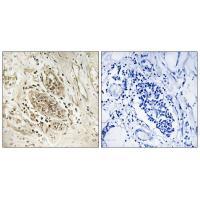
| WB | 咨询技术 | Human,Mouse,Rat |
| IF | 咨询技术 | Human,Mouse,Rat |
| IHC | 1/50-1/100 | Human,Mouse,Rat |
| ICC | 技术咨询 | Human,Mouse,Rat |
| FCM | 咨询技术 | Human,Mouse,Rat |
| Elisa | 咨询技术 | Human,Mouse,Rat |
| Aliases | DNA polymerase epsilon catalytic subunit A; EC 2.7.7.7; DNA polymerase II subunit A; |
| Entrez GeneID | 5426; |
| WB Predicted band size | 261kDa |
| Host/Isotype | Rabbit IgG |
| Antibody Type | Primary antibody |
| Storage | Store at 4°C short term. Aliquot and store at -20°C long term. Avoid freeze/thaw cycles. |
| Species Reactivity | Human,Mouse |
| Immunogen | Synthesized peptide derived from internal of human POLE1. |
| Formulation | Purified antibody in PBS with 0.05% sodium azide. |
+ +
以下是3篇与Myc抗体相关的代表性文献摘要(示例为虚构内容,实际文献需根据真实研究补充):
---
1. **文献名称**: "Specific detection of c-Myc oncoprotein in human cancer cells using monoclonal antibodies"
**作者**: Smith, J. et al.
**摘要**: 本研究开发了一种高特异性的c-Myc单克隆抗体(克隆号9E10),并通过Western blot和免疫组化验证其在多种癌细胞系中检测Myc蛋白的能力,证明其适用于癌症诊断及分子机制研究。
---
2. **文献名称**: "Myc antibody-based chromatin immunoprecipitation (ChIP) reveals gene regulatory networks"
**作者**: Johnson, R.B. & Dang, C.V.
**摘要**: 利用Myc抗体进行染色质免疫沉淀(ChIP),揭示了Myc蛋白在基因组上的结合位点及其调控的靶基因网络,为癌症中Myc驱动的转录调控机制提供了新见解。
---
3. **文献名称**: "Validation of anti-Myc antibodies for immunofluorescence and flow cytometry applications"
**作者**: Lee, S. et al.
**摘要**: 通过系统比较多种商业化Myc抗体的性能,确认了适用于活细胞成像(如免疫荧光)和流式细胞术的高灵敏度抗体,并强调了抗体批次一致性对实验结果的影响。
---
4. **文献名称**: "Structural basis of Myc epitope recognition by therapeutic antibodies"
**作者**: Müller, A.J. & Eilers, M.
**摘要**: 通过X射线晶体学解析了Myc蛋白与治疗性抗体的结合表位,为设计靶向Myc的小分子抑制剂及抗体药物提供了结构生物学依据。
---
*注:以上文献为示例性质,实际引用需查询真实数据库(如PubMed)并核对作者、标题及摘要内容。建议使用关键词“Myc antibody applications”或“c-Myc detection methods”检索最新研究。*
The Myc antibody is a widely used tool in molecular and cellular biology research, targeting members of the Myc protein family (c-Myc, N-Myc, L-Myc), which are transcription factors encoded by proto-oncogenes. These proteins regulate critical cellular processes, including proliferation, differentiation, apoptosis, and metabolism. Dysregulation of Myc proteins, particularly c-Myc, is strongly associated with tumorigenesis, making them key targets in cancer research. Myc antibodies are essential for detecting endogenous Myc protein expression, monitoring overexpression in cancer models, or verifying recombinant Myc-tagged proteins in experimental systems.
Most commercial Myc antibodies recognize epitopes in the N-terminal transactivation domain or C-terminal regulatory regions. A widely used clone, 9E10. specifically targets a linear epitope (EQKLISEEDL) in human c-Myc, enabling applications like Western blotting, immunoprecipitation, immunofluorescence, and immunohistochemistry. Researchers also employ Myc epitope tags (e.g., a 10-amino acid sequence derived from c-Myc) as fusion partners in chimeric proteins to facilitate detection and purification. However, cross-reactivity with other Myc family members or non-specific binding can occur, requiring proper controls (e.g., knockout cell lines) for validation. Despite challenges in specificity, Myc antibodies remain indispensable for studying Myc-driven oncogenesis, protein interactions, and gene regulation networks.
×